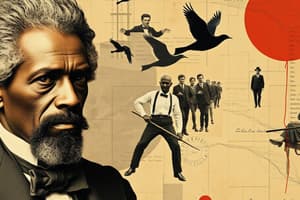Podcast
Questions and Answers
What specific act of defiance did Frederick Douglass undertake to gain knowledge, despite the restrictions imposed on enslaved people?
What specific act of defiance did Frederick Douglass undertake to gain knowledge, despite the restrictions imposed on enslaved people?
- Publicly protesting against his enslaver's treatment of other enslaved people.
- Refusing to work in the fields as a form of resistance.
- Secretly learning to read and write, defying laws against educating enslaved people. (correct)
- Organizing secret meetings to discuss strategies for rebellion.
How did Frederick Douglass's autobiography, Narrative of the Life of Frederick Douglass, an American Slave, directly contribute to the abolitionist movement?
How did Frederick Douglass's autobiography, Narrative of the Life of Frederick Douglass, an American Slave, directly contribute to the abolitionist movement?
- It offered a detailed legal argument for the unconstitutionality of slavery.
- It provided financial support to abolitionist organizations through book sales.
- It exposed the brutal realities of slavery to a wide audience, bolstering support for abolition. (correct)
- It outlined a plan for the gradual emancipation of enslaved people, gaining political traction.
What was the primary reason Frederick Douglass traveled to Europe after publishing his autobiography?
What was the primary reason Frederick Douglass traveled to Europe after publishing his autobiography?
- To seek medical treatment for an illness he contracted while enslaved.
- To study European agricultural techniques and apply them to abolitionist farming communities.
- To escape potential recapture and garner international backing for the abolitionist cause. (correct)
- To negotiate with European powers for the establishment of a colony for freed enslaved people.
Beyond the abolition of slavery, for what specific rights did Frederick Douglass advocate in the post-Civil War era?
Beyond the abolition of slavery, for what specific rights did Frederick Douglass advocate in the post-Civil War era?
Which of the following best describes how Frederick Douglass's early life experiences uniquely positioned him as a leader in the abolitionist movement?
Which of the following best describes how Frederick Douglass's early life experiences uniquely positioned him as a leader in the abolitionist movement?
Frederick Douglass held what significant government position after the Civil War, demonstrating his continued commitment to public service and African American rights?
Frederick Douglass held what significant government position after the Civil War, demonstrating his continued commitment to public service and African American rights?
What common challenge did Frederick Douglass face after gaining freedom and becoming a public speaker and how did he overcome it?
What common challenge did Frederick Douglass face after gaining freedom and becoming a public speaker and how did he overcome it?
How did Frederick Douglass's efforts to promote education align with his broader goals for African Americans in the United States?
How did Frederick Douglass's efforts to promote education align with his broader goals for African Americans in the United States?
Flashcards
Who was Frederick Douglass?
Who was Frederick Douglass?
Born into slavery, he became a leading abolitionist, writer, and orator.
When and where was Douglass born?
When and where was Douglass born?
February 1818 in Maryland (exact date unknown).
How did Douglass gain literacy?
How did Douglass gain literacy?
He secretly learned to read and write, which empowered him to advocate for freedom.
How did Douglass escape slavery?
How did Douglass escape slavery?
Signup and view all the flashcards
What is Narrative of the Life of Frederick Douglass?
What is Narrative of the Life of Frederick Douglass?
Signup and view all the flashcards
What rights did Douglass advocate for after the Civil War?
What rights did Douglass advocate for after the Civil War?
Signup and view all the flashcards
What government position did Douglass hold?
What government position did Douglass hold?
Signup and view all the flashcards
What is Douglass's lasting legacy?
What is Douglass's lasting legacy?
Signup and view all the flashcards
Study Notes
- Frederick Douglass overcame obstacles to become a powerful abolitionist, writer, and orator.
- His work and legacy continue to inspire generations, making him a key figure to study during Black History Month.
Early Life and Escape from Slavery
- Douglass was born in February 1818 in Maryland.
- Records were often not kept for enslaved people, so he never knew his exact birth date.
- He was separated from his mother at an early age and endured harsh conditions under slavery.
- Despite laws against teaching enslaved people to read and write, Douglass secretly learned literacy skills.
- He escaped slavery at the age of 20 by disguising himself as a sailor and traveling north.
- Douglass settled in Massachusetts, where he began his career as an abolitionist speaker and writer.
Abolitionist Work and Writing
- Douglass became a prominent speaker against slavery very quickly.
- He worked with famous abolitionists like William Lloyd Garrison.
- He spoke at anti-slavery conventions across the country.
- In 1845, he published his autobiography, Narrative of the Life of Frederick Douglass, an American Slave.
- His autobiography exposed the cruelty of slavery and became a bestseller.
- Some people doubted that an escaped enslaved person could be so articulate due to his powerful writing and speeches.
- He traveled to Europe to avoid recapture and gain support for the abolitionist movement.
- Upon returning to the U.S., he purchased his legal freedom and continued to fight against slavery.
Later Life and Legacy
- After the Civil War, Douglass remained active in advocating for African American rights.
- He advocated for voting rights, education, and equal treatment under the law.
- Douglass held several government positions, including U.S. Minister to Haiti.
- Douglass's contributions to American history are profound.
- His speeches, books, and relentless fight for justice paved the way for future civil rights movements.
- Currently, he is remembered as a symbol of courage, intellect, and perseverance.
Conclusion
- Douglass’s life story embodies resilience and determination.
- His fight for freedom and equality helped shape the United States.
- Celebrating his legacy during Black History Month highlights the importance of education, activism, and standing up for justice.
Studying That Suits You
Use AI to generate personalized quizzes and flashcards to suit your learning preferences.




